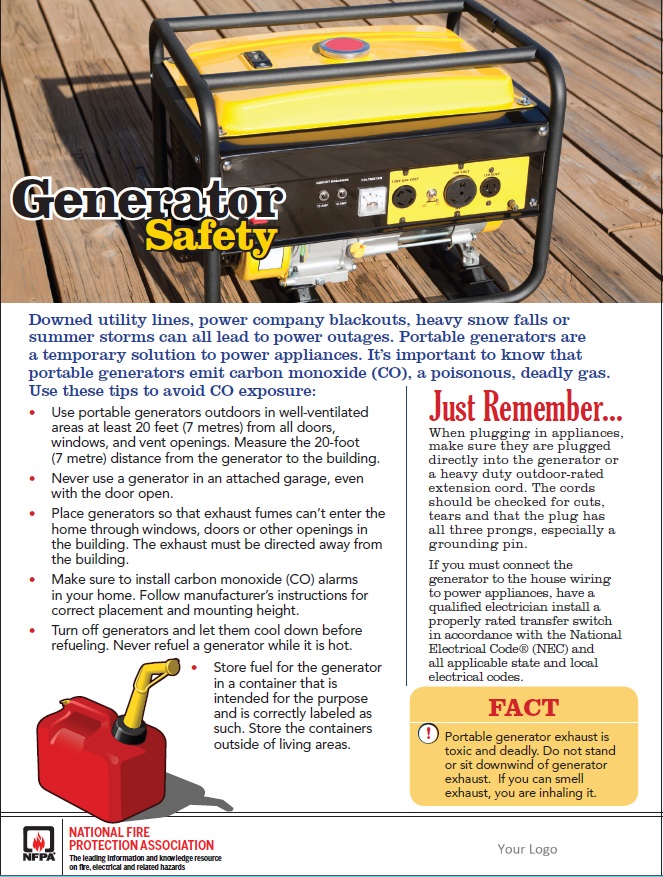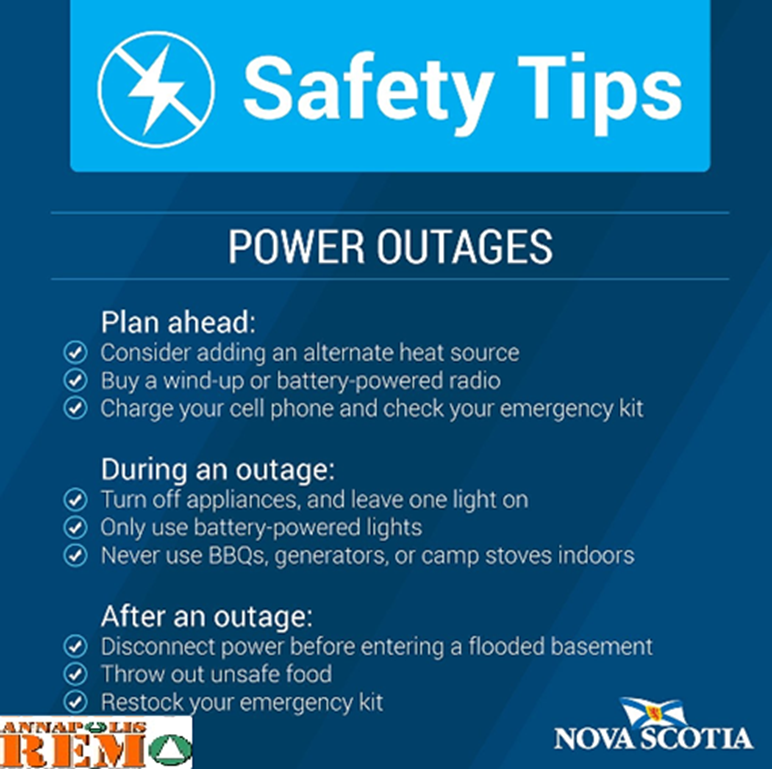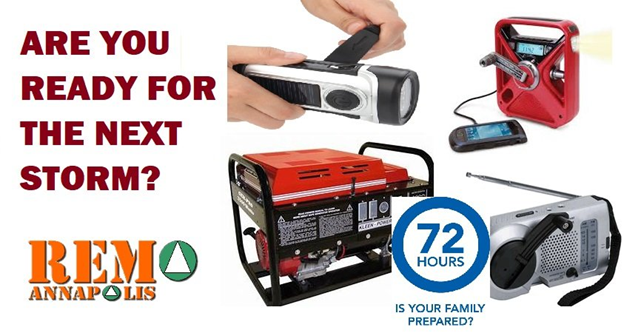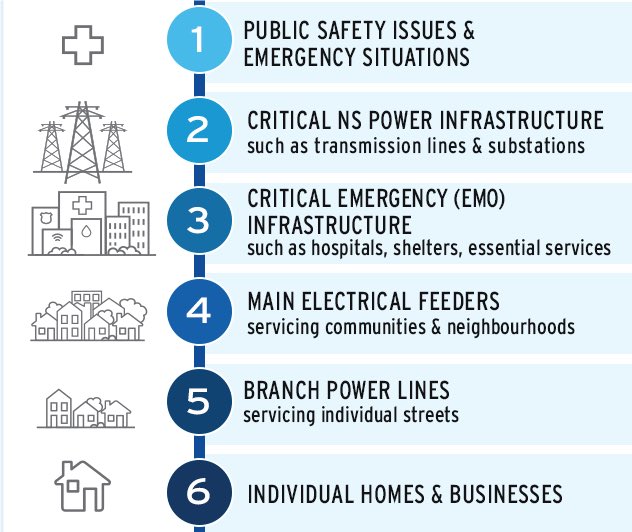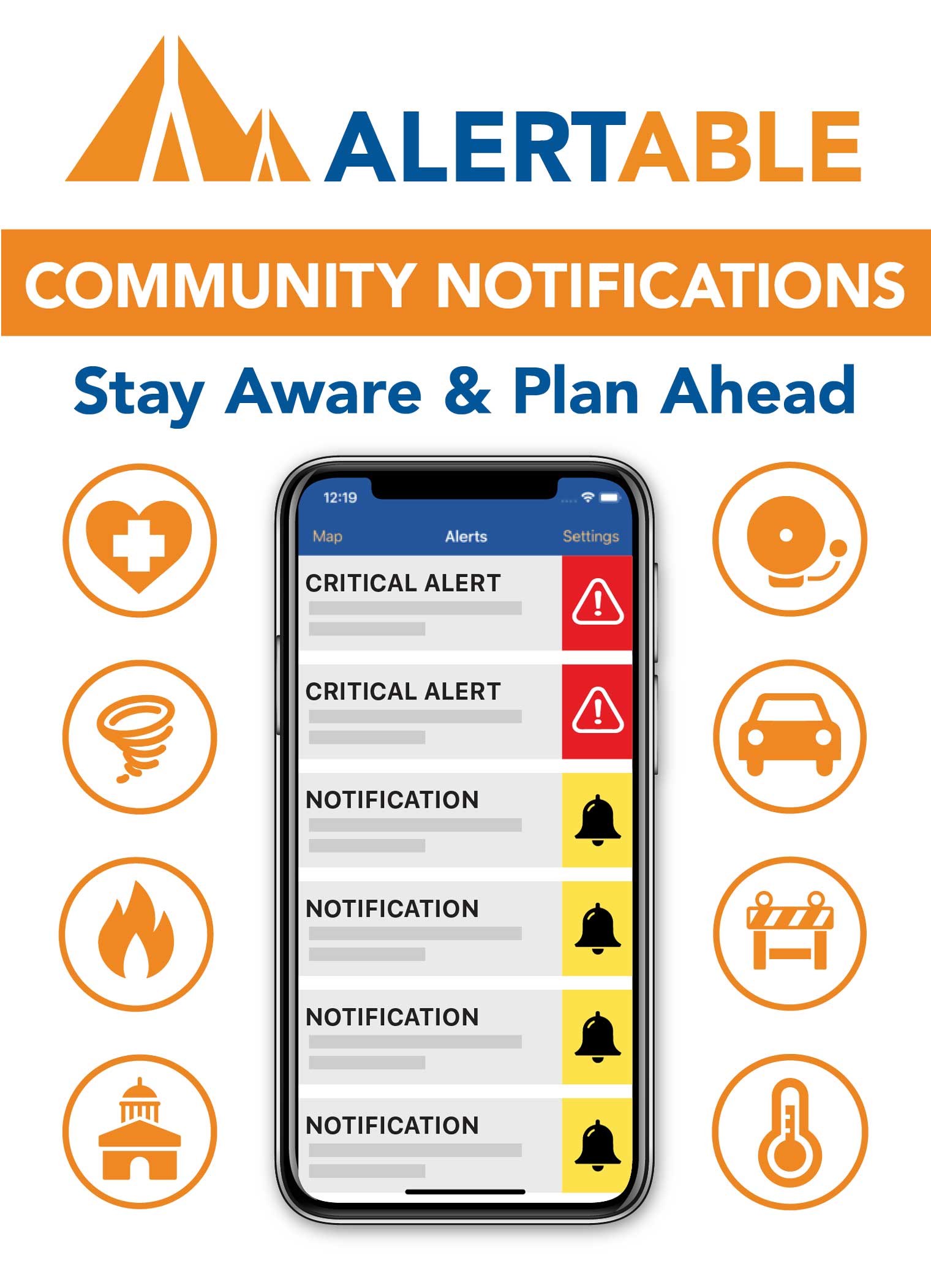Power Outages
Power Outages
Power Outages
Power outages can happen at any time, often due to severe weather. Strong winds can cause trees and branches to come into contact with power lines, while lightning strikes, heavy snow or ice buildup, and extreme weather events like hurricanes can also lead to disruptions. Cold snaps and heat waves may also strain the power grid, increasing the risk of outages.
While many outages are brief, some can last for days or even weeks. During an extended outage, you may be without heating or cooling, lighting, hot water, and even running water. Cordless phones and internet services may also be unavailable, making it difficult to communicate or receive updates.
Being prepared can help reduce the impact of a power outage. Having an emergency plan and a well-stocked emergency kit ensures you and your family can safely shelter in place for at least 72 hours. The Annapolis Regional Emergency Management Organization (REMO) encourages residents to plan ahead, stay informed, and be ready for potential disruptions.
Before a Power Outage
Being prepared before an outage happens can make all the difference. Take steps to create an emergency plan, gather essential supplies, and protect your home from potential damage. Click here to learn how to get ready in advance.
During a Power Outage
When the power goes out, staying safe and informed is key. Know what steps to take to keep your family warm, food safe, and devices powered. Click here for tips on managing a power outage effectively.
After a Power Outage
Once power is restored, it’s important to check for any damage, restock emergency supplies, and ensure your home is safe. Click here to learn what to do after an outage to prevent future issues.
Reporting a Power Outage & Nova Scotia Power Outage Map
⚡ Reporting Power Outages ⚡
📞 Report a Power Outage or Downed Power Line: 1-877-428-6004 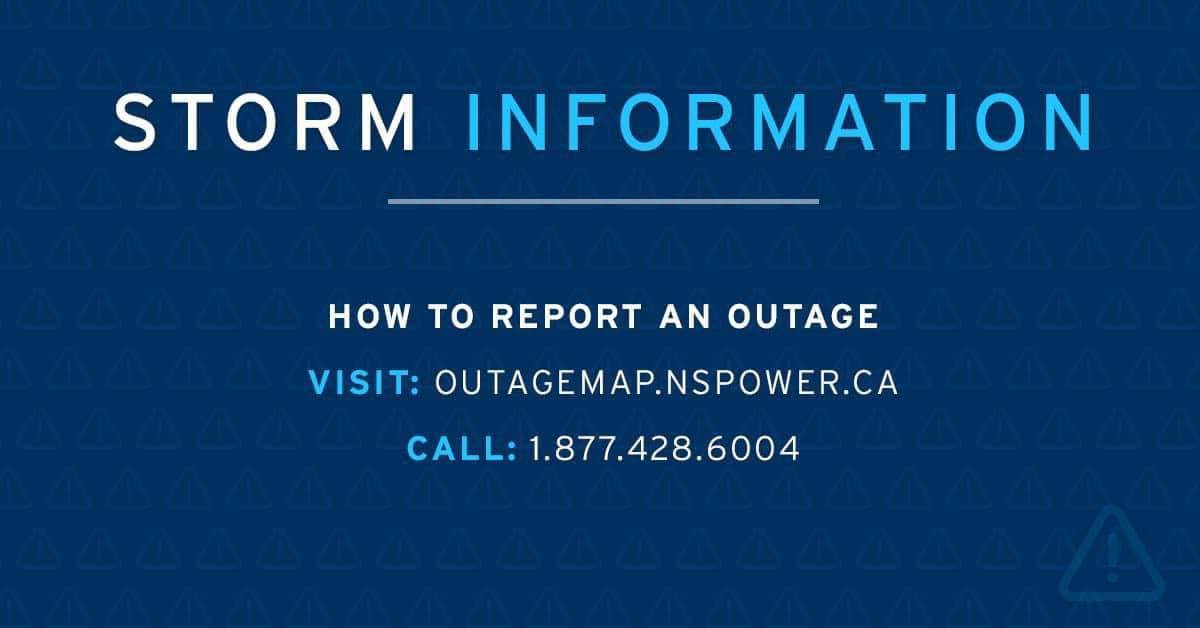
or
Use the Online Ns Power Report Form: https://nsp.ifactornotifi.com/ui/m/outage-reporting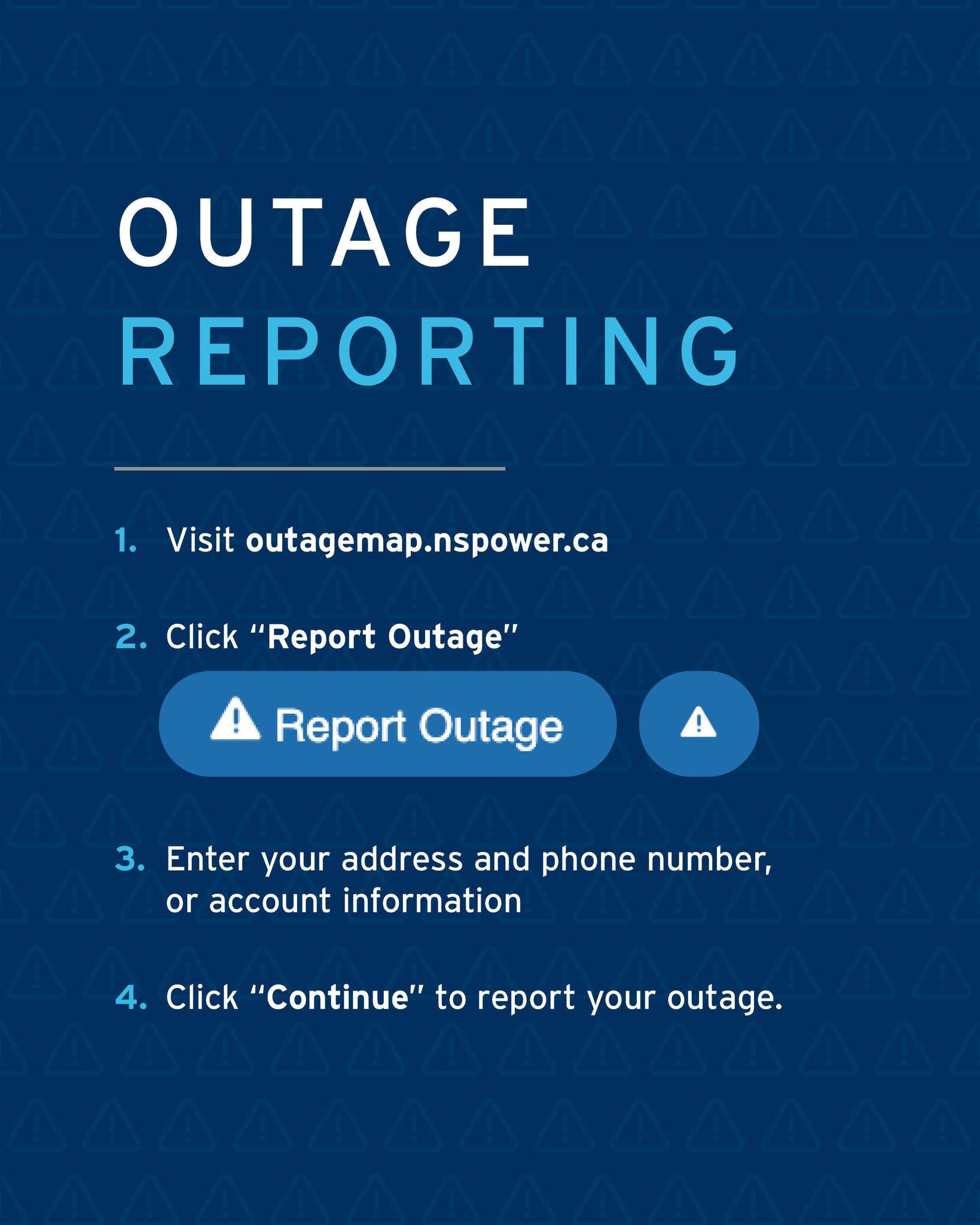
🗺 Outage Info Map:
The Nova Scotia Power Outage Map is an online tool that provides real-time information on power outages across the province. It allows residents to:
🔹 View active outages in their area
🔹 Check estimated restoration times
🔹 See outage causes (if known)
🔹 Report an outage directly to Nova Scotia Power
The map updates every 10 minutes to provide the most current information.
You can access it here: NS Power Outage Map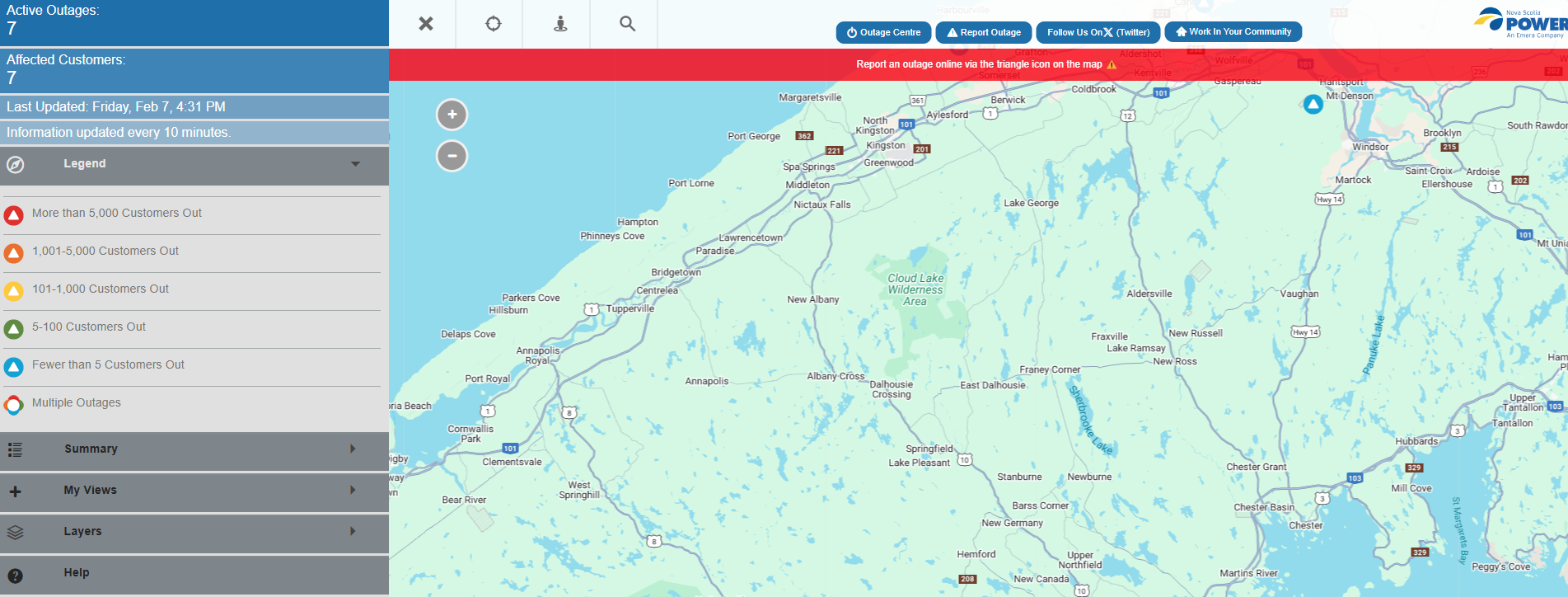
ℹ General Outage Information: NS Power Outage Centre
Quick Tips to Be Prepared:
🔦 Ensure your flashlights are working.
🖥 Check the outage map for the latest updates—refreshes every 10 minutes.
🔌 Unplug all TVs, electronics, and appliances.
💡 Turn off all light switches except one to know when power is restored.
🚪 Keep fridge and freezer doors closed to maintain cold temperatures
Power Outage Tips
Be Prepared for Power Outages
What you should do before
The best way to protect yourself and your family in case of a power outage is to follow these three steps:
- Know your risks: Find out the most common causes of power outages.
- Make a plan: Work with your family to make a plan so that when a power outage happens, you are ready.
- Get a kit: Assemble an emergency kit with essentials to keep your household safe and comfortable during a power outage.
Read more about steps you can take to prepare ahead of an emergency such as a power outage.
Tips on what to do during a power outage
- Listen to your battery-powered or wind-up radio for information on the outage and advice from authorities.
- Check whether the power outage is only in your home. If your neighbours' power is still on, check your circuit breaker panel or fuse box. Keep emergency numbers, like your power company, near your telephone.
- If your neighbours' power is also out, contact your power company.
- Turn off all your appliances and electronic equipment, and turn your heating thermostats down to a minimum to prevent damage from a power surge when the power is restored.
- Turn off all your lights, except one inside and one outside, so that both you and power crews outside know that power has been restored.
- Don't open your freezer or fridge unless it’s absolutely necessary. A full freezer will keep food frozen for 24 to 36 hours if the door remains closed.
- Never use charcoal or gas barbecues, camping heating equipment, or home generators indoors because they give off carbon monoxide.
- Use proper candle holders (deep, wide holders are best) and never leave lit candles unattended.
Do:
- Report downed power lines – and stay well away.
- Secure windows and doors as well as outdoor furniture and equipment.
- Park vehicles in protected areas, if possible.
- Keep a few taps slightly open to prevent pipes from freezing.
- Limit cell phone use to conserve battery life.
- Check on family, friends and neighbours – and offer help if they need it.
- Keep generators outdoors, well away from windows and doors.
Don’t:
- Use BBQs, propane heaters or portable generators indoors or in enclosed spaces such as garages, covered porches and sheds – they generate carbon monoxide gas, which can be fatal.
- Use a gas stove as a source of heat.
- Open your fridge or freezer more than necessary. Do not place frozen food outside even in winter.
- Go near areas of standing water, like a flooded basement or building.
- Leave candles unattended. Whenever possible, use a flashlight.
- Touch or go near a downed line – they can cause injury or death.
For what to do to stay safe after a power outage, find some information from Public Safety Canada.
Reporting and Monitoring Power Outages with Nova Scotia Power
- Report Power Outage or Downed Powerline(s): 1-877-428-6004
- Outage Info Map: http://outagemap.nspower.ca
- General Information about Power Outages: https://www.nspower.ca/en/home/outage-centre/
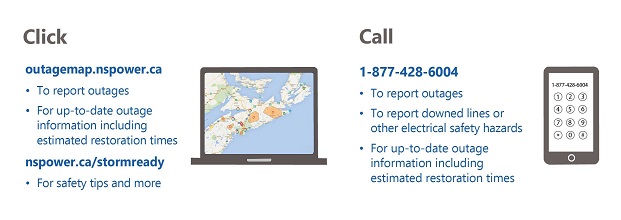
Are you and your family ready for the next storm? Have your Flashlight (battery or hand-crank)? Have your Radio (battery or hand-crank)? Have your Generator? Is your Basic 72 Hour kit fully stocked?
Find out how you can be prepared: getprepared.gc.ca/cnt/rsrcs/pblc
Nova Scotia Power follows a safety-first approach to restoration and starts by addressing public safety concerns, followed by critical infrastructure. https://nspower.ca/about-us/articles/details/articles/2020/10/26/outage-restoration-101
Check on your generator(s) to be prepared for potential power outages.
It is also important to keep in mind these safety tips when using generators!
